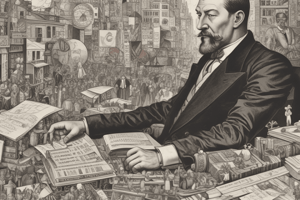Podcast
Questions and Answers
What is the main goal of businesses in a capitalist system?
What is the main goal of businesses in a capitalist system?
- To provide goods and services for the public good.
- To make a profit by lowering costs and increasing sales. (correct)
- To create a society where everyone is financially equal.
- To ensure everyone has equal access to resources.
How does competition play a role in capitalism?
How does competition play a role in capitalism?
- Competition encourages businesses to collaborate and share resources.
- Competition drives innovation and keeps prices low for consumers. (correct)
- Competition helps businesses create monopolies and control prices.
- Competition eliminates the need for government regulation.
What is one of the main criticisms of capitalism?
What is one of the main criticisms of capitalism?
- Capitalism creates a social hierarchy that leads to inequality. (correct)
- Capitalism eliminates the need for government intervention in the economy.
- Capitalism ensures that all workers are paid a fair and living wage.
- Capitalism promotes a strong sense of community and shared resources.
What does the term "privilege" signify in the context of capitalism?
What does the term "privilege" signify in the context of capitalism?
How is capitalism connected to the concept of race?
How is capitalism connected to the concept of race?
How can privilege be understood in relation to different social identities?
How can privilege be understood in relation to different social identities?
What is one way capitalism can perpetuate inequality?
What is one way capitalism can perpetuate inequality?
What is a key difference between capitalism and socialism?
What is a key difference between capitalism and socialism?
What was a major way that white business owners profited from slavery?
What was a major way that white business owners profited from slavery?
What did government policies like redlining continue to reinforce after slavery?
What did government policies like redlining continue to reinforce after slavery?
In the context of the Matrix of Domination, what does the term 'privilege' refer to?
In the context of the Matrix of Domination, what does the term 'privilege' refer to?
How does capitalism contribute to maintaining inequality?
How does capitalism contribute to maintaining inequality?
What paradox is described regarding privilege and oppression?
What paradox is described regarding privilege and oppression?
What impact did segregation have on racial inequalities?
What impact did segregation have on racial inequalities?
Why is understanding the connection between capitalism, privilege, and oppression important?
Why is understanding the connection between capitalism, privilege, and oppression important?
Flashcards
Racial Inequalities
Racial Inequalities
Economic and social disparities faced by racial groups.
Matrix of Domination
Matrix of Domination
Concept that shows how privilege and oppression overlap.
Capitalism and Race
Capitalism and Race
Capitalism relies on racial inequalities for profit.
Redlining
Redlining
Signup and view all the flashcards
Privilege and Oppression
Privilege and Oppression
Signup and view all the flashcards
Economic Division
Economic Division
Signup and view all the flashcards
Systemic Oppression
Systemic Oppression
Signup and view all the flashcards
Capitalism
Capitalism
Signup and view all the flashcards
Economic Hierarchy
Economic Hierarchy
Signup and view all the flashcards
Social Classes
Social Classes
Signup and view all the flashcards
Privilege
Privilege
Signup and view all the flashcards
Inequality in Capitalism
Inequality in Capitalism
Signup and view all the flashcards
Race and Capitalism
Race and Capitalism
Signup and view all the flashcards
Competition in Capitalism
Competition in Capitalism
Signup and view all the flashcards
Access to Resources
Access to Resources
Signup and view all the flashcards
Study Notes
Capitalism and Privilege
- Capitalism is an economic system where private individuals and businesses control resources (land, factories, etc.), unlike a government-controlled system.
- The main goal is profit, achieved by minimizing costs and maximizing sales. Competition between businesses and workers is inherent in this system.
- Capitalism has created wealth and economic growth, but it has also led to significant inequalities, where some gain immense wealth while others struggle.
Capitalism and Social Class
- Capitalism inherently creates different social classes. The wealthiest own businesses and resources, while most people work for wages.
- This creates an economic hierarchy, giving some more opportunities and power than others.
- Those in control (owners) influence wages, working conditions, and prices. Those at the bottom often face difficulties meeting basic needs.
- This economic hierarchy impacts areas like education, healthcare, and politics.
Capitalism, Difference, and Privilege
- Privilege is unearned advantages that benefit specific groups; in capitalism, this is closely tied to economic power.
- Wealthier individuals have easier access to better schools, healthcare, and political influence, contrasting with those without wealth who face greater challenges.
- Privilege is multifaceted, encompassing race, gender, and other social identities.
- Historically, capitalism has relied on creating and maintaining differences to exploit different groups. Exploitation includes lower wages and competition among workers as ways to keep wages low and power at the top.
Race and Capitalism
- Race is a social construct, not biological, usedhistorically to justify inequality.
- Capitalism's early days saw European colonizers and slave traders using race to justify enslaving African people for enormous profit.
- This system built significant wealth, even after slavery ended.
- Racial inequality remains present, impacting opportunities for land ownership, education, and employment. This is often enforced through government policies like segregation and redlining.
The Matrix of Domination
- The "matrix of domination" concept highlights how different types of privilege and oppression intersect.
- A person can experience privilege in some areas (e.g., race) while facing disadvantage in others (e.g., gender).
- Capitalism benefits from having different forms of oppression, as it makes it harder for people to unite for change.
Paradox of Privilege and Oppression
- Many people experience both privilege and oppression simultaneously.
- For example, a white working-class person might benefit from racial privilege but struggle financially.
- A wealthy woman might have financial power but still face sexism.
- This highlights that oppression is part of the system, not just individual experiences.
Conclusion
- Capitalism significantly shapes privilege and oppression.
- It creates social class differences and reinforces racial and gender inequalities, leading to varying access to power and wealth. Understanding these connections is vital for a more just society.
Studying That Suits You
Use AI to generate personalized quizzes and flashcards to suit your learning preferences.




